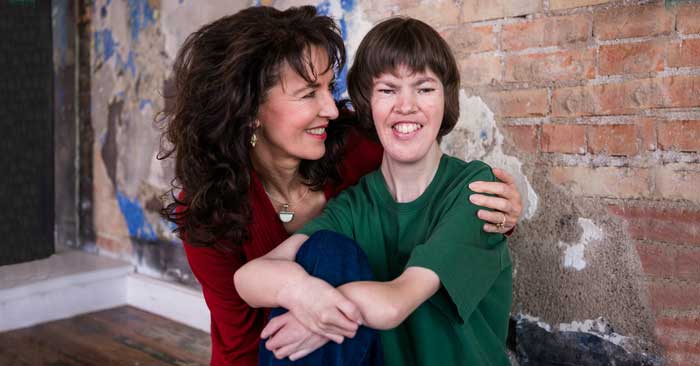
Are you a caregiver? Would you like to learn some valuable tips about connecting to your heart while you’re caregiving? In this talk, “The Heart of Caregiving,” I teach using my lifetime of experiences. I show how caring from your heart can help you be a better caregiver and bring you more joy.
Learn What Works in Caregiving
Having multiple disabilities, I have received care all of my life. I’ve learned what works and doesn’t work in a caregiving relationship.
I spoke as part of a 3-day conference for caregivers, social service professionals, and medical professionals. This was at the University of Utah. This is a video of my talk. The transcript of the talk is below.
Watch, “The Heart of Caregiving,” with Heather Madsen
Summary of, “The Heart of Caregiving”
Learn actions you can take that will support you in giving conscious, loving care for the whole person. I also talk about being conscious of their feelings. Also, being conscious of their voice, and supporting their essence and contributions.
Altogether, taking these steps increase the fulfillment of both you and the care receiver. These steps help create the Heart of Caregiving.
5 Tips for A Heart-Centered Caregiver
- Choose to be a heart-centered caregiver and remember your purpose.
- Connect to your heart to create balance and find Self-love.
- Focus on the qualities needed to succeed. These are patience, gratitude, consistency, tone of voice, respect, forgiveness, good communication, and empathy.
- Focus on the benefits gained which include positive influences for both care receiver and caregiver, opportunities for each person, becoming a more conscious person, developing new perspectives, creating more joy, developing character values, and fulfilling your purpose.
- Choose to focus on the present moment, and make every decision a conscious choice.
Sharing Personal Experiences Through Writing
 In my talk, I also present how I accept and overcome my challenges of everyday life through writings of prose and poetry, as well as inspirational speaking. In my writings and speeches, I connect to my life’s experiences in a raw, sensory way. I show my unique perspective on beauty, love, and gratitude.
In my talk, I also present how I accept and overcome my challenges of everyday life through writings of prose and poetry, as well as inspirational speaking. In my writings and speeches, I connect to my life’s experiences in a raw, sensory way. I show my unique perspective on beauty, love, and gratitude.
Also, in addition to being born with the visible, rare genetic condition called i, which has resulted in over 20 surgeries, I have a rare genetic lung disease called primary ciliary dyskinesia (PCD), autism spectrum disorder (ASD), attention-deficit/hyperactivity disorder (ADHD), and a hearing impairment.
Heather’s Background as a Public Speaker
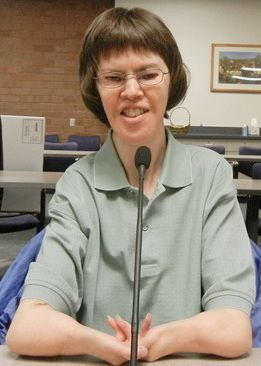 For 20 years, I have addressed medical students at major universities about the unique impacts my disabilities create in the medical profession. As a keynote speaker for Autism Speaks, I shed light on some of the complexities of autism. Recent speeches include topics such as seeing beyond appearances, accepting challenges, and insights into communication.
For 20 years, I have addressed medical students at major universities about the unique impacts my disabilities create in the medical profession. As a keynote speaker for Autism Speaks, I shed light on some of the complexities of autism. Recent speeches include topics such as seeing beyond appearances, accepting challenges, and insights into communication.
I have spoken before university groups, CEOs of major institutions, government institutions, community organizations, inspirational forums, and public libraries.
Heather’s Background as a Writer
I love writing and have been published in several media outlets, including the book, Eight Fingers and Eight Toes: Accepting Life’s Challenges and I am a regular guest writer at debbiejorde.com. I earned a B.S. degree in Psychology from the University of Utah. I’m looking forward to future opportunities to speak because I enjoy connecting with an audience.
Transcript of Heather’s talk, The Heart of Caregiving, for caregivers.
39 years ago, my mom had a decision to make. In her words, here is her story of when I was born.
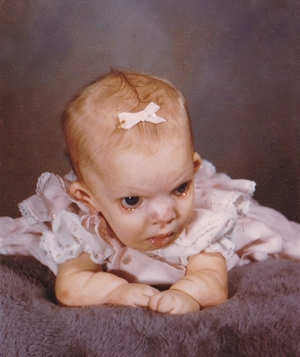 “Immediately after Heather’s delivery, it was obvious that something was wrong with her arms. Denial set in immediately. I kept hearing my voice say, “No, her arms are fine. Everything is okay. This isn’t happening. I want to go home, get pregnant, and have a different baby. I don’t want this baby.”
“Immediately after Heather’s delivery, it was obvious that something was wrong with her arms. Denial set in immediately. I kept hearing my voice say, “No, her arms are fine. Everything is okay. This isn’t happening. I want to go home, get pregnant, and have a different baby. I don’t want this baby.”
Night time brought sleeplessness and tears. I kept waking up thinking I had a horrible dream only to realize it wasn’t a nightmare. Still crying in the morning, I had all my phone calls stopped. I couldn’t bear to hear the words, “I’m so sorry,” confirming reality. I wasn’t ready.
Later that day, I was compelled to walk down to the nursery. Standing outside the nursery window looking at the only baby in the room, I thought, “All the other babies are gone because they are with their mothers. She is all alone because her mother doesn’t want her and I’m the mother.” Tears were streaming down my face when a nurse asked, “Would you like to hold her?” I said, “Yes.”
The nurse placed Heather in my arms as I sat in a rocking chair and left us alone. I looked at the baby in my arms thinking, “This is the baby that was moving inside me.” Suddenly my heart opened and filled with indescribable love. That love has carried me through all my caregiving.
Remember Your Purpose
My mom had a purpose. She wanted to be a good mother. When she was confronted with the reality that her baby wasn’t normal, her dreams were shattered. She faced a soul-searching choice. Should she choose to hold on to her picture of what she wanted and try again, or should she choose to embrace this baby.
During this time, her dad offered a way out. “You don’t have to worry about a thing. I’ve made some arrangements to have the baby cared for if you don’t want to keep her.” She said, “It’s alright Dad, I want to keep her.”
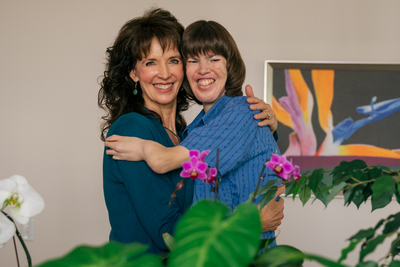 My mom chose to embrace what is. Her purpose from then on was to love me with all her heart. She raised me with unconditional love. She focused on and encouraged my strengths. In that moment, she demonstrated the single most important decision that a caregiver has to make. Choice. In so doing, she programmed herself with Purpose for Success and accepted the challenges ahead. She chose to be a Heart-centered caregiver and give conscious, loving care with the purpose of increasing fulfillment; both hers and mine.
My mom chose to embrace what is. Her purpose from then on was to love me with all her heart. She raised me with unconditional love. She focused on and encouraged my strengths. In that moment, she demonstrated the single most important decision that a caregiver has to make. Choice. In so doing, she programmed herself with Purpose for Success and accepted the challenges ahead. She chose to be a Heart-centered caregiver and give conscious, loving care with the purpose of increasing fulfillment; both hers and mine.
My mother’s choices have influenced me greatly, nurturing the building of my self-confidence, and helped me to discover and to bring out my true essence. Her conscious decisions have made it possible for me to live a purposeful, joyful life and to help make positive differences in other people’s lives too. Being a heart-centered caregiver means connecting to your heart to create balance, focusing on qualities needed to succeed and the benefits gained, choosing to focus on the present moment, and making every decision a conscious choice.
Major Challenges My Caregiver Helps Me Overcome
Major challenges that I have include Miller Syndrome, a lung disease, autism, attention deficit disorder, and esophageal spasms. The differences you see when you look at me are caused by Miller syndrome. It is a genetically rare condition, which affects bone and muscle formation. I have a cleft palate, which is why I sound nasal. My hands and feet are missing the fifth fingers and toes. It also affects my face, ears, shoulders, chest, forearms, hands, legs, feet, my hearing and a few organs here and there. So, all of me pretty much.
I am not able to reach my neck, my upper chest at all, the back of my head, under my arms, my tailbone area, and parts of my back. Everywhere else requires extreme stretching and flexibility. For scratching an itch push pencils are really useful and I always keep them around. Hygiene maintenance takes a lot of extra effort and energy. Reaching the backs of cabinets or top shelves involves tools or other humans because my arms and fingers are not long enough and my range of motion is limited.
You’d think being tall would be helpful, but this just means I have to bend down farther for everything so I often squat or sit on the floor. I am very intimate with the ground. Also, I don’t use the oven. The risk of falling in doesn’t seem at all that appealing.
Challenges with autism include identifying and using the context of a situation to understand what people are saying, staying on task, and dealing with environmental stressors such as room lighting, noises, movements, music and not getting overwhelmed and overstimulated and here I am a public speaker.
I have a rare genetic lung disease called Primary Ciliary Dyskinesia- PCD for short. It prevents the cilia from bringing mucus out of my lungs causing lung infections. Doing an hour of lung therapy twice a day helps. My live in aide, Rubin, keeps the equipment sanitized.
One aspect of conscious caregiving is for you, as a caregiver, to connect to your heart to create balance.
When caregivers give care with purpose, they add incredible amounts of love to the relationship, discovering more about themselves and the care receiver. My mother takes care of more than just my body and physical needs. She chooses to care for the whole person. This creates a deeper connection with me and with herself.
Self-love is the first step to treating a care receiver, and yourself as a whole person. The most important relationship is the one you have with yourself. The caregiving role encourages you to be in balance with yourself, so you can care for another in the most fulfilling way. Here is an example of a caregiver who lost her balance and her relationship with herself.
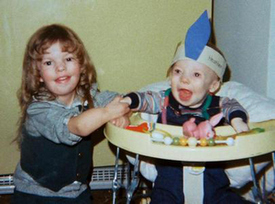 After giving birth to me, and 3 years later my brother with the same disabilities, my mom dealt with many challenges. She got divorced, leaving her a single mother on government benefits and in poverty when we were only 3 and 6. She worked at home as a self-employed hairstylist and taught aerobics and she was struggling.
After giving birth to me, and 3 years later my brother with the same disabilities, my mom dealt with many challenges. She got divorced, leaving her a single mother on government benefits and in poverty when we were only 3 and 6. She worked at home as a self-employed hairstylist and taught aerobics and she was struggling.
Not having learned to practice self-love, my mother was always putting other people before herself. This led to her developing the eating disorder bulimia. She hit bottom, and through the course of getting help she learned the importance of having self-love. She began to say no instead of yes and she hired childcare so she could have time alone. Taking care of her needs cleared her perspective, which helped her stay focused on her commitment and purpose to provide loving care to Logan and me. One way to gain self-love is to quiet your mind and connect to your heart. This will guide you into balance with your own needs and the needs of the receiver.
So what is the whole person? At times, I feel like I’m having a love affair with life! I am fascinated with all the beauty and expressions life has to offer. I see the intimate details of life that tickle my soul and make me feel alive! Something as ordinary as watching water falling from the faucet gives me joy and because joy is connected to love, I feel love. I live for these moments! I know I am bigger than my challenges.
If somebody doesn’t take consistent care of my physical needs, I can’t share my essence. My caregiver is this person. In order to do this there are qualities of conscious caregiving that brings benefits to both the caregiver and the care receiver.
Eight qualities of a conscious caregiver for heart-centered caregiving are:
…patience, gratitude, consistency, tone of voice, respect, forgiveness, good communication, and empathy. Caregivers can make a choice to act with purpose. With caregiving there are many actions that are repeated over and over. These can be done with automatic repetition, which is a reaction to what needs to be done, or they can be done with a conscious choice.
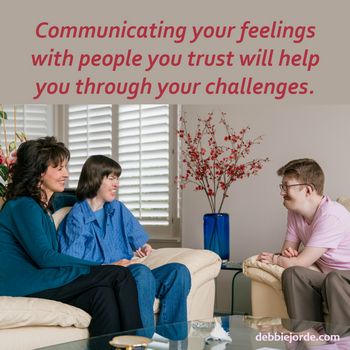 My mom used empathy when listening to my concerns. She was consistently there for me with my constant need for explanations and reassurances about social interactions and their consequences, and all life’s changes. She also explained what caused her reactions. Autism makes these situations difficult by creating anxiety and uncertainty for me until I adjust to the change. This requires that the caregiver be empathetic, attentive, respectful, and patient. Mom was open-minded while listening to my dreams and ideas, giving me confidence and self-esteem.
My mom used empathy when listening to my concerns. She was consistently there for me with my constant need for explanations and reassurances about social interactions and their consequences, and all life’s changes. She also explained what caused her reactions. Autism makes these situations difficult by creating anxiety and uncertainty for me until I adjust to the change. This requires that the caregiver be empathetic, attentive, respectful, and patient. Mom was open-minded while listening to my dreams and ideas, giving me confidence and self-esteem.
Traveling, challenges these eight qualities more than most day-to-day situations. Traveling to the bi-annual Foundation for Nager and Miller Syndrome, FNMS, conference where I can contribute to and benefit from other families affected with the same syndrome, requires a great deal of caregiving.
Both physical and autistic challenges affect how well I can pack. While packing, Rubin helps me stay focused on being packed on time and also what to pack. I would get tired of packing, take rests, and then get distracted. Rubin purchased, chopped, mixed, individually bagged, labeled and packed all ingredients needed to take on the trip, for mom to mix my smoothies in the hotel room. These stressful chores can drive a caregiver to re-choose constantly to use all the caregiving qualities in order to continue being a conscious caregiver.
By the time mom picked me up to drive to the airport, I felt confident, safe, excited and grounded….and Rubin was relieved to see me go. Now it was mom’s turn to care for me AND my brother.
Mom chose Delta Airlines, where she requested 2 wheelchairs and help with 5 pieces of carry-on luggage for 3 people with disabilities. Mom has MS. All went smoothly in the Salt Lake Airport. LA was a different story. Two wheelchairs were waiting but the wheelchair attendants said they were not allowed to put the luggage in the wheelchair and let Logan and me walk, so there was NO help for all the luggage. Mom, using a soft, but firm and respectful, tone of voice asked for a manager. At this point, the flight and gate attendants, as well as the people waiting for their flight were circling around us. Mom cried from the overload of stress created, but remained persistent.
Caregiving Influences People to Grow
I could have been very upset during this event, but I wasn’t. Rubin and my mom had assisted me every step of the way during packing my food and belongings, so I felt safe before I left. Feeling secure, I recognized lessons that so many people were learning from this experience, which included communication, respect, forgiveness, and empathy. I felt like we were important parts of creating a bigger experience for the personal and spiritual growth of all the people involved. When I told mom about this she filled with gratitude knowing that her caregiving influenced people to grow.
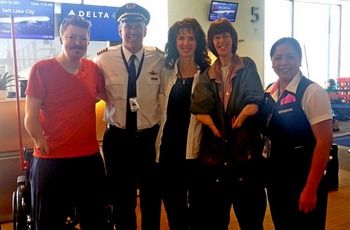 Eventually, an airport manager, Jesse, came to our rescue. He arranged help and also arranged help in New Orleans. What could have been a bad experience, turned out to be a positive experience because heart-centered caregiving was given to me before we left and because we were able to adjust our perspective and see the good that came of it.
Eventually, an airport manager, Jesse, came to our rescue. He arranged help and also arranged help in New Orleans. What could have been a bad experience, turned out to be a positive experience because heart-centered caregiving was given to me before we left and because we were able to adjust our perspective and see the good that came of it.
After seven days in New Orleans, it was time to fly home. At 10 pm in our hotel room, the night before leaving, we struggled with many issues. Delta required that we all ride in a wheelchair to have help with our luggage, and mom agreed. I didn’t want to ride in the wheelchair the whole time and I felt powerless being forced to do it. Mom didn’t have the patience to listen to what I wanted. I was having trouble understanding her perspective and why she made the choice for us all to have wheelchairs. Her patience was severely strained and she raised her voice with me. Using a soft tone of voice helps to keep me calm and cared about.
Context Is Important When Caregiving People Having Autism
I don’t like it when I make social mistakes because of autism. My intelligence knew better, but the autism didn’t. Mom was tired of fighting the system and resigned to sit in wheelchairs. Logically, I understood that Delta didn’t have help for bags only, but autistically, I was missing the context of mom’s emotional state. Her self-care had been limited. She missed taking her much needed rest, so when she and I had the conversation, she couldn’t handle her emotions and my autism very well.
During our interaction, she couldn’t illuminate the contexts I needed to fully understand her point of view. We ended up yelling at each other and she was crying. This made me sad. I hate it when my autism makes people so stressed that they become emotionally unstable. My autism was relentless and this was too much for her.
When I don’t understand something, I persist, stressing my caregiver to the max. I fail to see when the other person is unavailable to help me understand because they have broken down emotionally. I am aware of this pattern, but I still step into the mess because I can’t see the social context well enough about what is happening with the other person. My autism makes it almost impossible to avoid. Being aware and respectful of each other’s patterns and mood changes helps create conscious, loving relationships. Practicing the qualities of conscious caregiving is important, especially during stressful situations.
Also important in conscious caregiving is to focus on the benefits you, as the caregiver, gain…
…which include positive influences for both care receiver and caregiver, opportunities for each person, becoming a more conscious person, developing new perspectives, creating more joy, developing character values, and fulfilling your purpose. Seeing caregiving as an opportunity for personal and spiritual growth, opens hearts and makes space for appreciation of your role, allowing you to give more freely without feeling like it is a burden.
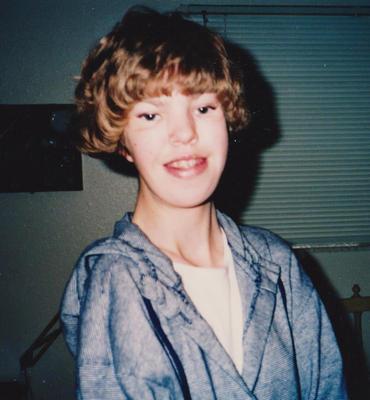 When I was young, my mom modeled a positive attitude, honesty, boundaries, and clear intentions. She taught me how to solve problems, talk about feelings, and love others. Consciously focusing on giving me these skills, she improved her own abilities in these areas too. She used compassion when teaching and encouraging me to drive even though I was afraid to drive. She lovingly explained my options and taught me I have choices: Choose to ride the bus, stay home, or to drive with the fear. Also, she explained that she couldn’t be my chauffer anymore because she was choosing to take care of herself as well as me, and I also needed to make a choice. I chose to drive.
When I was young, my mom modeled a positive attitude, honesty, boundaries, and clear intentions. She taught me how to solve problems, talk about feelings, and love others. Consciously focusing on giving me these skills, she improved her own abilities in these areas too. She used compassion when teaching and encouraging me to drive even though I was afraid to drive. She lovingly explained my options and taught me I have choices: Choose to ride the bus, stay home, or to drive with the fear. Also, she explained that she couldn’t be my chauffer anymore because she was choosing to take care of herself as well as me, and I also needed to make a choice. I chose to drive.
My mother chooses to express positive energy when caring for me, which reduces my stress and helps me know I’m not a burden. Resting, eating, and doing things she enjoys helps her be fulfilled, giving her the ability to connect to her heart and purpose before caring for me. Her positive energy helps me as much as her physical help. When Rubin has taken care of himself he smiles at and acknowledges me, encourages me and treats me with respect and courtesy. I feel these positive reinforcements in my soul.
Caregiver Can Develop Character Values
Caregiving brings opportunities to develop character values, which include better communication, love, patience, kindness, empathy, gratitude, consistency, respect, forgiveness, and open-mindedness. The challenges involved can shake up old conditioning and make room for the new of what is, giving the caregiver opportunities to be fully present in the moment, which can extend to all their relationships. Through needing care, the receivers challenge the caregivers to shift their perspectives and get out of their comfort zone, growing and expanding in consciousness and personal growth.
As you give care, you are building the foundation on which the receiver will be able to contribute their own efforts and insights that could affect many people. Receiving conscious, loving care gives me the time and energy to make positive contributions to society and enjoy life, instead of caring only for my disabilities. I speak publically, socialize with people, teach, and write about my experiences. My caregivers help me learn to communicate and build social connections which brings joy into both our lives. This joy radiates into the lives of all the people who love me.
Another aspect of conscious caregiving is to stay focused on being present in each moment. It is very important to be conscious of what is happening in your immediate experience because that is all there is. This allows you to respond with purpose instead of reaction.
Quote for Caregivers: “Cross that bridge when/if it comes.”
One gloomy, cold day in January 2009, mom was driving home from teaching aerobics. She was feeling depressed and couldn’t understand why she wasn’t able to lift her spirits. She pulled into a parking lot, turned off the car, and put her head on the steering wheel. Then she asked herself, “Why am I depressed?” She got her answer. Having almost lost me to pneumonia 7 months before, her thoughts were dwelling on future possibilities: “When will Heather get sick again? Will Logan and Heather get sick at the same time? And will I lose them both? Will this winter be the one where they get the flu and I lose them?”
In the past she had always lived by the motto, “I’ll cross that bridge if it comes,” which helped her focus on being in the moment. Realizing that her worries were the cause, she made the conscious choice to stop worrying about the future and be in the moment. Consistently practicing this contributed to her ability to be an effective, conscious caregiver.
Caregiving Needs in Hospitals
By being present, you can notice your feelings, the care receiver’s needs and concerns, and listen to the voice of the care receiver more easily. Having a voice is important when in the hospital. Often my caregiver or family are my voice and I like to have them around at all times. They could step in my shoes and imagine what they would need if they were me. When I’m lying in a hospital bed, call buttons and side-rail buttons are just out of my reach. Reaching water cups, kleenex boxes, and food trays on the table sitting just past the bed rails is all but impossible.
As is tying and untying gowns, hygiene maintenance, and just about everything else when I am incapacitated in the hospital. I worry that buzzing the nurses each time I can’t reach something or need assistance stresses the staff and tries everyone’s patience. As time goes on, and due to my autistic nature, I worry that the staff might not respond to my needs as quickly. I resort to the aid and nearly fulltime presence of family members or friends to be my arms, hands, and legs. In addition to this, I am further stressed by not being able to do my typical reading and online research. These are important aspects for me that link me daily to the outside world.
Eight years ago, I was hospitalized with a collapsed lung and severe pneumonia, with much difficulty breathing. Because of my autism, I was constantly concerned with what was going on around me.
I wanted my family around me at all times to be my voice. After my lung was re-inflated and the crisis was over, I continued to fight to have my family with me to be my voice. Lack of sleep caused another sort of crisis. It decreased my pain tolerance and my ability to mentally cope with stimulation.
My doctor saw the seriousness of this turn of events and knew that I needed to be alone and needed sleep. She realized how bad my obsessive concerns were and firmly ordered me to sleep often and to reduce constant social interaction with my family. They had to go. She helped me see the importance of this choice. Once I was forced to sleep and have time without social stimulation, I did feel better– emotionally and physically. By focusing in the present moment, my doctor became my voice and helped me make a conscious decision to do the best thing.
Finally, make every decision a conscious choice. This relies on perspective.
Being present in the moment is necessary to make conscious decisions. When I was in junior high, I really gave my mom an opportunity to practice these. One day I received a letter inviting me to enter a Miss Teenage America Pageant. I read the letter and approached mom with a beaming smile, telling her that I would like to enter the contest. Mom’s heart squeezed. She didn’t know how to react or what to say. My mom had always encouraged me to do the things I wanted to do, because she didn’t always know what was possible. She was hesitant about encouraging me to enter a contest such as this, however, she didn’t want to discourage me either because it might keep me from trying things in the future. Worse than that, she might damage my self-esteem.
Being in the moment and coming from the guidance of her heart, she asked me if I read the third rule, saying that the participant must have good health. I said, “I read it and the doctors say that I am healthy.” Mom said, “You are healthy for someone with Miller syndrome, but are you healthy in comparison to someone like me?” I said, “When you put it like that, no, I am not healthy.”
Mom suggested that I call and tell them about myself. I thought, “Good idea!” She told me to write down what to say, questions I would ask, and well as a description of myself.
A few minutes later I returned to mom and said, “Describing myself over the phone could make the person think I look like a freak.” Mom’s heart ached. She suggested that I write a letter describing myself, send a picture, and that way the person could see what I look like. Again, I thought, “Good idea!” A few days went by. I had been thinking and made a decision. I said to mom, “I’ve decided that I don’t want to enter the pageant.”
“Why not?” mom asked. I said that if I were watching a pageant like this on TV and I saw someone that looked like me I would think it was weird. After realizing that, I decided not to enter the pageant.
Mom felt sad and relieved: sad at the reality that because I look different, I can’t do some of the things that other teenage girls can do, and relieved that she didn’t make the decision for me by discouraging me, for following the direction that her heart took her, and gratitude that I felt satisfied.
She knew she wanted to preserve my self-esteem; however, she wanted to be honest and realistic too. Sometimes the balance is hard to find. This took perspective. She made the conscious decision to protect my self-esteem in every situation. By being present and making conscious choices, she allowed the answer to unfold.
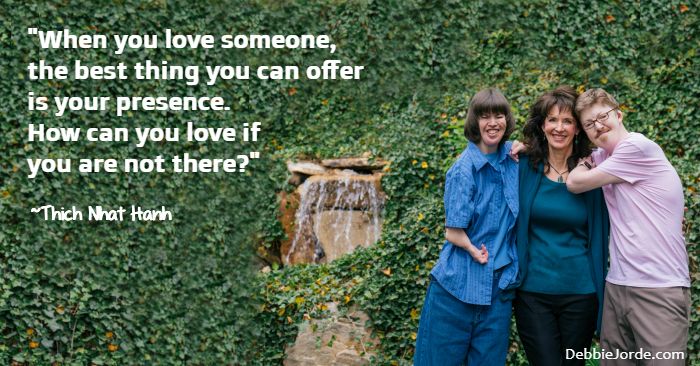
To sum up, The Heart of Caregiving,
in the words of Thich Nhat Hanh “When you love someone, the best thing you can offer is your presence. How can you love if you are not there?” Choose to be a heart-centered caregiver and remember your purpose. Connect to your heart to create balance and find Self-love. Focus on the qualities needed to succeed which are patience, gratitude, consistency, tone of voice, respect, forgiveness, good communication, and empathy. Focus on the benefits gained which include positive influences for both the care receiver and caregiver, opportunities for each person, becoming a more conscious person, developing new perspectives, creating more joy, developing character values, and fulfilling your purpose. Choose to focus on the present moment, and make every decision a conscious choice.
These support you in giving conscious, loving care for the whole person, being conscious of their feelings, their voice, and supporting their essence and contributions. Altogether, these increase the fulfillment of both you and the receiver, creating the Heart of Caregiving.

I leave you with a short poem I wrote that symbolizes the caregiving relationship. It is called Waking up to Self.
It speaks to me in silhouettes and soft whispers,
touching my skin, tingling, warm and comfortable.
One of my eyes peeks open, curious, hungry.
I feel the sensations stirring my energy,
swirling and gentle,
full and only just beginning,
waking me up to myself,
becoming aware.
Ever softly, but with power and grace,
I remember.
I remember myself, full of love and intelligence.
The connection of deep knowing,
my soul reaching through the illusion
and bringing me truth.
I feel my savory taste of trust
winding its way through
like an umbilical cord,
back to my home of Self.
All is there, waiting for me,
embracing my journey,
and merging with my awareness.
I awaken to the joy of Self.
All knowledge active and playing,
mingling with pleasure and laughing in song,
the vibration of One flows and changes.
The sweet nectar of merging with my Self,
opens the petals of love,
releasing the purity of life energy within me.
The difference you are making is far bigger than you can imagine.


Hi Heather Madsen!
It became difficult to read all the text about your life as the tears ran down son Niagara Falls on my cheeks, I read more any other day, now I see nothing anyway… switches to writing to you, my name is Stellan Clausen, and I have followed you on Facebook, I have Autism and Asperger’s Syndrome, I’m retired early, I don’t have any real friends, I had some friends as a child / young person until 1989, 1990 to today 2019 no friends at all, I sit alone 24 hours a day 365 days a year, 30 years without friends is a torture, only have Facebook friends, but I have no contact with them, I’m not good at writing, I can not speak English, I use google translate to write English to you, (hope google translates correctly) i send a friend request to you on facebook, I hope you approve of me as a friend on Facebook… now I will try to read more about your life, you are a wonderful woman. “excuse my bad English”
Sincerely yours: Stellan Clausen.
Thank you for your heart touching message. I know having autism isn’t easy, as I’ve observed in Heather and Logan’s lives. Keep reaching out to make connections on social media. It’s not the same as face to face friends, however I’ve found that it can help a little bit. You must be a Very strong person for dealing with having autism for so long. Always remember and rely on your strength. We wish the best for you!